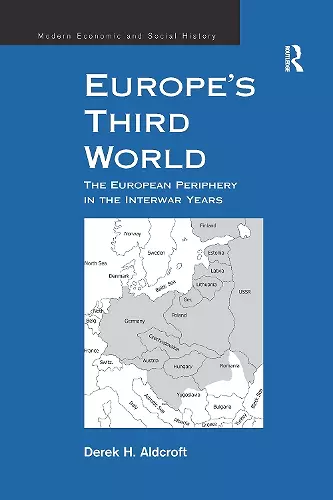Europe's Third World
The European Periphery in the Interwar Years
Format:Paperback
Publisher:Taylor & Francis Ltd
Published:26th Oct '16
Currently unavailable, and unfortunately no date known when it will be back
This paperback is available in another edition too:
- Hardback£150.00(9780754605997)

Economic historians have perennially addressed the intriguing question of comparative development, asking why some countries develop much faster and further than others. Focusing primarily on Europe between 1914 and 1939, this present volume explores the development of thirteen countries that could be said to be categorised as economically backward during this period: Albania, Bulgaria, Estonia, Greece, Hungary, Latvia, Lithuania, Poland, Portugal, Romania, Spain, Turkey and Yugoslavia. These countries are linked, not only in being geographically on Europe's periphery, but all shared high agrarian components and income levels much lower than those enjoyed in western European countries. The study shows that by 1918 many of these countries had structural characteristics which either relegated them to a low level of development or reflected their economic backwardness, characteristics that were not helped by the hostile economic climate of the interwar period. It explores, region by region, how their progress was checked by war and depression, and how the effects of political and social factors could also be a major impediment to sustained progress and modernisation. For example, in many cases political corruption and instability, deficient administrations, ethnic and religious diversity, agrarian structures and backwardness, population pressures, as well as international friction, were retarding factors. In all this study offers a fascinating insight into many areas of Europe that are often ignored by economists and historians. It demonstrates that these countries were by no means a lost cause, and that their post-war performances show the latent economic potential that most harboured. By providing an insight into the development of Europe's 'periphery' a much more rounded and complete picture of the continent as a whole is achieved.
'Professor Aldcroft's latest book provides a fascinating account of how and why Europe's '"Third World" remained mired in relative backwardness between 1918 and 1939 with even its best performers staying in the shadow of the advanced economies of Western Europe.' Dr Steven Morewood, University of Birmingham, UK ’Aldcroft's book is a compact and very useful survey on what we know about the economic development of the European Periphery during the interwar years... The main virtue of the book is to synthesize in a highly readable way a vast literature on the puzzling persistence of economic backwardness outside the north-western European core... It is a good starting point for further research into one of the most promising areas in European economic history.’ EH.NET ’... the book provides an important, often overlooked case study within the economic growth literature. But the text also represents a key contribution to the economic history of the European periphery... The structure of the book, with the explicit focus on individual countries and country groups, makes it extremely accessible for readers of different backgrounds - economics, economic history, and history. It also allows for a versatile use of the text in a variety of courses, for example, an upper-level undergraduate course on the economic history of Europe, or a class on economic growth.’ Australian Economic History Review ’Aldcroft’s new book will make a perfect textbook for courses on European economic history, assigned alongside a text on the economic history of Western Europe.’ European History Quarterly
ISBN: 9781138272958
Dimensions: unknown
Weight: 453g
232 pages